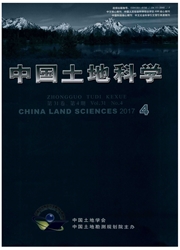

 中文摘要:
中文摘要:
研究目的:从理论和实证两个方面分析社会因素、经济因素以及政策制度因素对农地城市流转的影响,辨识主导因素,为政府决策提供依据。研究方法:利用岭回归法,应用SAS软件分析。研究结果:(1)居民收入水平与耕地消耗率之间存在显著正相关关系,随着居民收入水平的提高,农地城市流转有加剧趋势;(2)耕地消耗率并没有随着产业结构调整而降低,这与中国各地区耕地资源禀赋有关,但同时表明现阶段中国土地利用集约化程度并没有随着产业结构升级而提高;(3)随着地均GDP的增加、征收耕地市价水平的升高以及城市化水平的提高,耕地消耗率有上升趋势;(4)随着耕地利用效益的增加、土地市场化配置程度的提高以及总人口的增加,耕地消耗率呈下降态势,但回归不显著。研究结论:居民收入水平、土地市场化程度以及产业结构调整等是农地城市流转的主要影响因素,在现阶段应合理引导居民的消费需求,提高土地配置的市场化程度,并随着产业结构升级积极引导土地利用结构优化,降低耕地消耗率。
 英文摘要:
英文摘要:
The purpose of this paper is to identify principal factors influencing rural-urban land conversion thus to provide reference for the decision making by the government, on the basis of theoretical analysis of social, economic and institutional factors. Methods of ridge regression model and SAS software were employed. The econometric output shows there is a significant positive relationship between the residents' income and the loss rate of cultivated land. The rural land conversion keeps pace with the increase of the residents' income. The loss rate of cultivated land doesn't go down with the industry restructuring, which is related to the nature of cultivated land in different regions. That is to say, the intensive use degree of land does not keep pace with the upgrading of industrial structure at present. The increases of GDP/ha., the market price of requisitioned land, and the urbanization level also have positive effects on the loss rate of cultivated land. The result also indicates that the benefit of cultivated land, the development of land market and the total population have a negative relationship with the loss rate of cultivated land, but the coefficients on them are not significant. It is concluded that the farmers' income, land market and industrial restructuring are key factors influencing land conversion. As a result, such measures can be taken to lower the loss rate of cultivated land as conducting the consumption demand of the residents, improving the land market and upgrading the industrial structure.
 同期刊论文项目
同期刊论文项目
 同项目期刊论文
同项目期刊论文
 期刊信息
期刊信息
